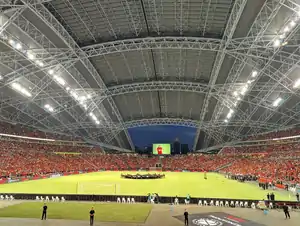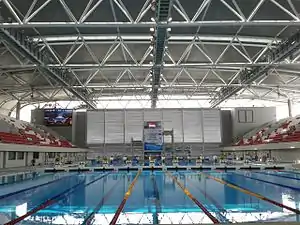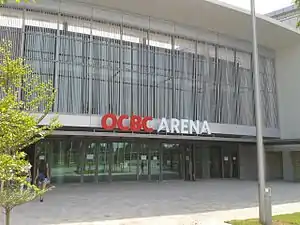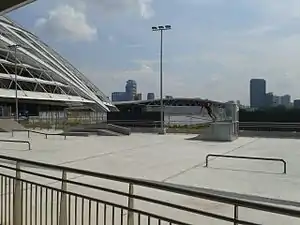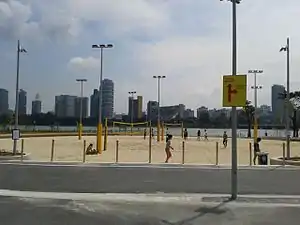Singapore Sports Hub
The Singapore Sports Hub is a fully integrated sports, entertainment and lifestyle hub in Kallang, Singapore. Built in 2014 to host sporting and entertainment events, it replaced the former National Stadium after it was demolished in 2010.[1] Its construction was based on a Committee on Sporting Singapore report to promote a culture of sports in the city-state.[2]
 | |
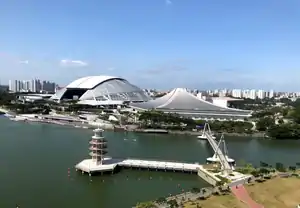 View of both the Singapore National Stadium and Indoor Stadium located within the Sports Hub | |
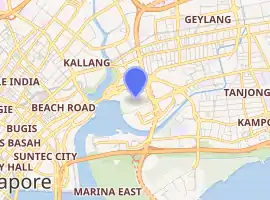
| |
| Location | Kallang, Singapore |
|---|---|
| Public transit | CC6 Stadium EW10 Kallang TE23 Tanjong Rhu (from 2023) |
| Operator | SportsHub Pte Ltd |
| Capacity | National Stadium: 55,000 Singapore Indoor Stadium: 12,000 OCBC Aquatic Centre: 6,000 OCBC Arena: 3,000 41,000 square metres of commercial pace and supporting leisure and commercial developments. |
| Construction | |
| Broke ground | 29 September 2010 |
| Opened | 30 June 2014 (Soft Opening) 26 July 2015 (Official Opening) |
| Construction cost | S$1.3 billion est. |
| Architect | Arup Architecture (National Stadium and Sports Venues), DP Architects (Non-Sport Venues, QP), AECOM (landscape) |
| Website | |
| www | |
It is the first and largest sports facilities infrastructure Public-Private-Partnership (PPP) project in the world and Singapore's flagship PPP project of this nature. Following an Invitation to Tender by the then Singapore Sports Council in 2006, the consortium SportsHub Pte Ltd comprising four equity partners, InfraRed Capital Partners, Dragages Singapore, Cushman & Wakefield Facilities & Engineering, and Global Spectrum Asia, won the bid for the project on 19 January 2008. It was officially appointed on 25 August 2010 to design, build, finance and operate the Singapore Sports Hub for a period of 25 years.
History
Construction of the Singapore Sports Hub began with a ground-breaking ceremony on 29 September 2010,[3] before the former arena there was demolished. Served primarily by the Stadium MRT station, it was completed in June 2014 and, among others, rolled out a new 55,000-seat National Stadium with the largest free-spanning retractable dome roof in the world,[4][5] an aquatic centre, a multi-sport indoor arena, and a water sports facility. The Singapore Sports Hub, which incorporated an existing 12,000-seat Singapore Indoor Stadium, began operations on 30 June 2014 for the general public to start using its facilities.[6] Prime Minister Lee Hsien Loong officially opened it 13 months later on 26 July 2015.[7]
The Rugby World Club 10s on 21–22 June 2014 was the first sporting event at the new national stadium.[8] The match between a Singapore Selection and Juventus Football Club on 16 August 2014 was the first football game held at the new stadium.[9]
Since opening its doors, the Sports Hub has been a venue for major international, regional and local events. It has played host to the 2015 SEA Games, 2016 Singapore National Day Parade, BNP Paribas WTA Finals, HSBC Singapore Rugby Sevens, International Champions Cup and superstars Madonna, Coldplay and Jay Chou.
Facilities
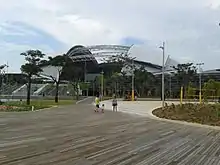
The 35-hectare Singapore Sports Hub includes the following facilities:
- A 55,000-capacity National Stadium with a retractable roof and movable tiered seating
- A 12,000-capacity Singapore Indoor Stadium
- A 6,000-capacity OCBC Aquatic Centre that meets FINA standards
- A 3,000-capacity OCBC Arena which is scalable and flexible in layout
- A Water Sports Centre featuring kayaking and canoeing
- A 41,000 sq m Kallang Wave Mall which features an indoor climbing wall
- A Splash-N-Surf facility (Kids Waterpark, Stingray and Lazy River)
- A 100PLUS Promenade that encircles the National Stadium
- Singapore Youth Olympic Museum & Singapore Sports Museum
- Sports Hub Library
- Shimano Cycling World
- 24/7 community facilities such as beach volleyball, hard courts (futsal, basketball and netball) lawn bowls, giant chess, skate park and running & cycling paths
Construction timeline
The demolition of the former National Stadium was slated to begin in 2008 while the construction of the new Sports Hub was originally planned for completion in 2011. Due to the financial crisis of 2007–2010 and high construction costs, the project was inevitably delayed. In 2008, barring any major problems, the hub should be ready by 2013 when Singapore would play host to the 27th Southeast Asian Games.[10] However, expected delays were announced in 2009 and Singapore had to withdrew its hosting rights for the 2013 Southeast Asian Games.[11][12] In August 2010, it was reported that the contract to begin construction had been signed with plans for the demolition works of the former National Stadium to start in October 2010 and for the completion of the new Sports Hub in April 2014. The demolition of the National Stadium started with a groundbreaking ceremony on 29 September 2010, marking the official end of the Grand Old Dame.[13]
Bid process
Three finalist consortia (Singapore Gold Consortium, Alpine Mayreder, Singapore Sports Hub Consortium) submitted their plans in Feb 2007.[14][15]
On 19 January 2008, the Singapore government awarded the development of the Sports Hub project to Singapore Sports Hub Consortium (SSHC), led by Dragages Singapore Pte Ltd.[16]
During the announcement of the successful bidder at a press conference, the minister of Ministry of Community Development, Youth and Sports, Dr Vivian Balakrishnan said,
"The Consortium displayed significant strengths in programming, team culture and partnership, functionality and layout. It also offered the best value for money solution for Singapore."[17]
Usage
Sports
| Year | Date | Events |
|---|---|---|
| 2015 | 5–16 June | 2015 Southeast Asian Games[18] |
| 2019 | 20–26 October | 2019 M1 Nations Cup[19] |
Gallery
|
See also
References
- "Newspaper Article - State-of-the-art sports hub in the offing, says Mr Abdullah". eresources.nlb.gov.sg. Retrieved 24 August 2016.
- "Report of the Committee of Sporting Singapore". Ministry of Community Development and Sports, Singapore. July 2001. Archived from the original on 23 September 2016.
- "Singapore Sports Hub - Marking A New Chapter Of A Sporting Singapore". Sport Singapore. Retrieved 11 June 2018.
- migration (27 February 2014). "Under one roof: Take a sneak peek at the Singapore Sports Hub". The Straits Times. Retrieved 11 June 2018.
- "Worlds largest dome roof under construction - Arup". www.arup.com. Retrieved 11 June 2018.
- "Free access for a month". TODAYonline. Retrieved 11 June 2018.
- hermesauto (26 July 2015). "PM marks Youth Day, opens Sports Hub in front of 50,000 crowd". The Straits Times. Retrieved 11 June 2018.
- "New National Stadium opens its doors as it hosts the Rugby World Club 10s". Archived from the original on 22 June 2014.
- "Football: Juventus beat S'pore Selection 5-0 in friendly at new National Stadium". AsiaOne. Retrieved 11 June 2018.
- "Sports Hub may now be ready only by 2012". The Straits Times. 17 June 2008.
- "S'pore may not host 2013 SEA Games due to Sports Hub delay". Channel NewsAsia. 30 September 2009.
- "We're not hosting SEA Games 2013". Archived from the original on 4 October 2011. Retrieved 13 January 2010.
- "Finally, groundbreaking ceremony for Sports Hub". Channel NewsAsia. 29 September 2010.
- Cheney, Satish (28 March 2007). "All 3 proposals for the new Sports Hub are 'truly spectacular': Vivian Balakrishnan". Channel NewsAsia.
- Singh, Patwant (5 November 2007). "Final race begins on proposals for Singapore Sports Hub". Channel NewsAsia.
- "'Cool Dome' design wins Singapore Sports Hub project". Channel NewsAsia. 19 January 2008.
- "Singapore Sports Hub Consortium, Led By Dragages Singapore Pte Ltd, Selected as Preferred Bidder For Sports Hub Project". Singapore Sports Council. 19 January 2008. Archived from the original on 23 January 2008.
- "2015 SEA Games in Singapore to be held from 5 to 16 June". Channel NewsAsia. Archived from the original on 11 June 2013. Retrieved 30 May 2013.
- "M1 Nations Cup 2019". netball org. Retrieved 11 October 2019.
External links
| Wikimedia Commons has media related to Singapore Sports Hub. |
